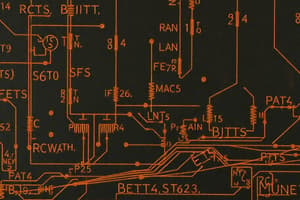Podcast
Questions and Answers
What does the current gain of a transistor amplifier measure?
What does the current gain of a transistor amplifier measure?
- The ratio of output power to input power
- The ratio of output current to input current (correct)
- The ratio of output voltage to input voltage
- The ratio of output impedance to input impedance
What is the main advantage of a Class A power amplifier?
What is the main advantage of a Class A power amplifier?
- High current gain
- High power output
- Low power conversion efficiency
- High power conversion efficiency (correct)
What affects the frequency response of a transistor amplifier?
What affects the frequency response of a transistor amplifier?
- Only the cutoff frequency of the transistor
- The cutoff frequency of the transistor, the load impedance, and the parasitic capacitances and inductances (correct)
- Only the load impedance
- Only the input signal frequency
What is the common emitter configuration commonly used for?
What is the common emitter configuration commonly used for?
What is the frequency region where the gain of the amplifier is significantly reduced?
What is the frequency region where the gain of the amplifier is significantly reduced?
What is the common characteristic of a common collector configuration?
What is the common characteristic of a common collector configuration?
What is the unit of measurement for gain?
What is the unit of measurement for gain?
What type of gain is measured as the ratio of output voltage to input voltage?
What type of gain is measured as the ratio of output voltage to input voltage?
In the formula Gain (dB) = 20 * log10 (Vout / Vin), what does Vin represent?
In the formula Gain (dB) = 20 * log10 (Vout / Vin), what does Vin represent?
What type of amplifier is used in audio equipment to increase the volume of audio signals?
What type of amplifier is used in audio equipment to increase the volume of audio signals?
Which type of amplifier is used in medical and industrial equipment to amplify low-level signals?
Which type of amplifier is used in medical and industrial equipment to amplify low-level signals?
What is a common application of Power Amplifiers?
What is a common application of Power Amplifiers?
Flashcards are hidden until you start studying
Study Notes
Current Gain
- The current gain of a transistor amplifier is defined as the ratio of output current to input current
- It is typically denoted by the symbol β (beta) and is a dimensionless quantity
- β is a measure of how much the transistor amplifies the input current
- A higher β indicates a higher current gain, which means a smaller input current is required to produce a certain output current
- Typical values of β for bipolar junction transistors (BJTs) range from 10 to 500
Power Amplification
- Power amplification refers to the ability of a transistor amplifier to increase the power of the input signal
- The power gain of an amplifier is defined as the ratio of output power to input power
- Power amplification is achieved by using a high-power transistor and a suitable load impedance
- There are several classes of power amplifiers, including:
- Class A: High power conversion efficiency, but low power output
- Class B: High power output, but low power conversion efficiency
- Class AB: A compromise between Class A and Class B
Frequency Response
- The frequency response of a transistor amplifier refers to its ability to amplify signals of different frequencies
- The frequency response is typically measured by plotting the gain of the amplifier against frequency
- There are several factors that affect the frequency response of a transistor amplifier, including:
- The cutoff frequency of the transistor
- The load impedance
- The parasitic capacitances and inductances of the amplifier
- The frequency response of an amplifier can be classified into three regions:
- Low-frequency region: The gain is relatively constant
- Mid-frequency region: The gain decreases with increasing frequency
- High-frequency region: The gain is significantly reduced
Amplifier Configurations
- There are several common amplifier configurations, including:
- Common emitter (CE) configuration: The most common configuration, which provides a high current gain and a moderate voltage gain
- Common collector (CC) configuration: Also known as an emitter follower, which provides a high current gain and a low voltage gain
- Common base (CB) configuration: Provides a high voltage gain and a low current gain
- Each configuration has its own advantages and disadvantages, and the choice of configuration depends on the specific application
Studying That Suits You
Use AI to generate personalized quizzes and flashcards to suit your learning preferences.




